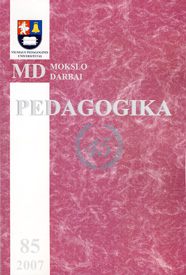Fenomenografija - kokybinės diagnostikos metodas: metodologinis pagrindimas
Phenomenography - method of qualitative diagnostic: methodological substantiation
Author(s): Vilma Žydžiūnaitė, Simona JonušaitėSubject(s): Education
Published by: Vytauto Didžiojo Universitetas
Keywords: phenomenography; phenomenology; interview; phenomenons; category
Summary/Abstract: 'In educational research phenomenography strives to find the right answers to ąuestions about thinking and learning, interaction / relationship betvveen people, relationship between people with the world. Phenomenography is the theory of knowledge and methodology, specialization of research, direction or autonomous method such as method of qualitative diagnostic. This method is useful in educational research: it describes different ways of experiencing the phenomenons that illuminate condition needful to better understanding and development of reality; students are empowered to become more flexible and to accept their decisions more consciously that are related to their surrounding world. The research problem indudes one questions: „What is the methodological oneness of phenomenography?" The research aim is to substantiate methodological parameters of phenomenography by highlighting premises of qualitative diagnostic. Research focus is phenomenography as method of ąualitative diagnostic. The research method was literature analysis. Nature of phenomenography is related to paradigm of qualitative research methodology and connects all basic parameters of ąualitative research: research instruments for qualitative data collection (semi - structured interview and observation) and principles (experiences and meanings through all interview is constructed by both -researcher and research participant). It is compulsory to realize the principles of openness to data and depersonalization of the researcher, objectivity. Data analysis typically is characterized by qualitative nature -elements of constructing and discovering the descriptive categories); research results are qualitative and representative only in groups that are characterized by the same attributes. Reliability of phenomenography is proved by verification of coding, discussions of researchers, precision and clear description of the main research elements (construction of categories, sample, and questions). Relevance is substantiated by parameters that are typical to qualitative diagnostic: representative sampling, validity of interview content, its transcriptions and analysis; recognition of research results in academic community and availability for research population and educational science.
Journal: Pedagogika
- Issue Year: 2007
- Issue No: 85
- Page Range: 76-80
- Page Count: 5
- Language: Lithuanian

